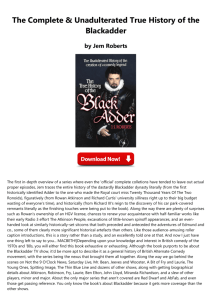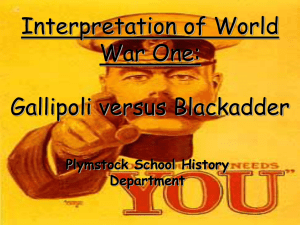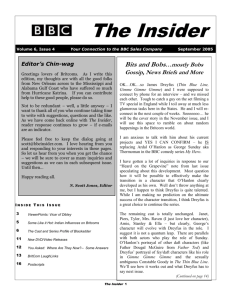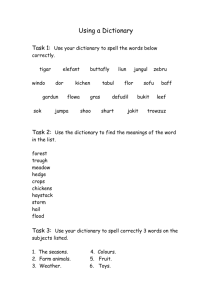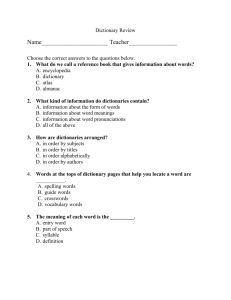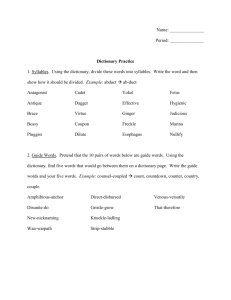An analysis of the linguistic features that contribute to the effect of an
advertisement
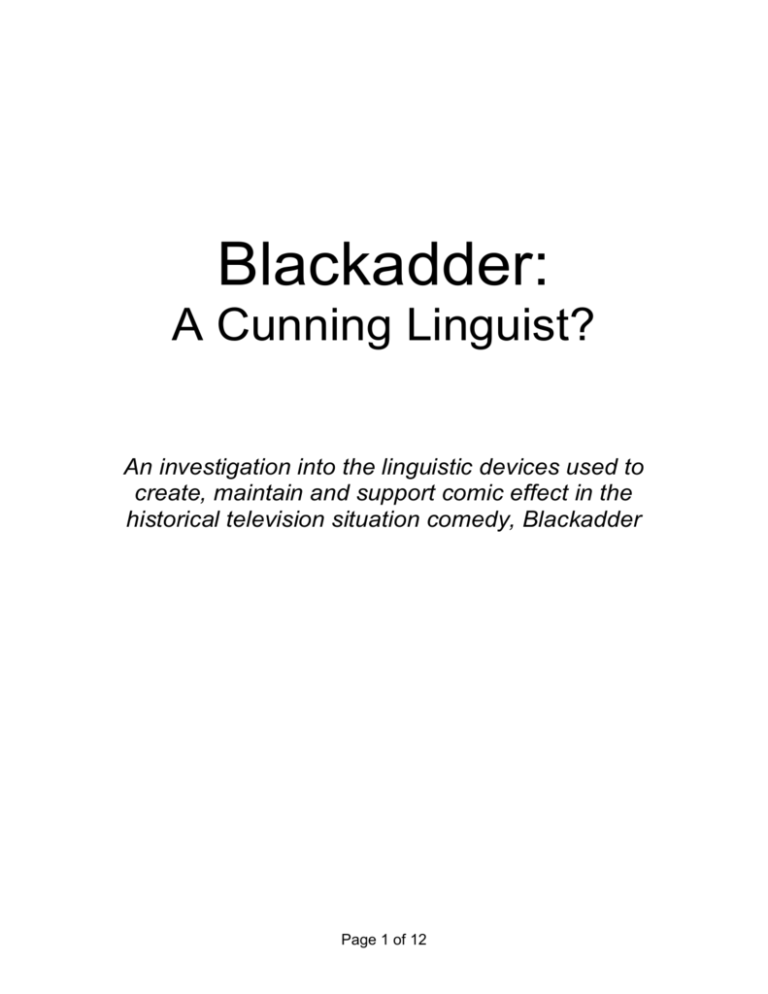
Blackadder: A Cunning Linguist? An investigation into the linguistic devices used to create, maintain and support comic effect in the historical television situation comedy, Blackadder Page 1 of 12 Contents 1. Introduction 3 2. Description of Data 4 3. Aim 4 4. Methodology 4 5. Analysis Lexical Features Grammatical Features Character-Specific Devices and Idiolect Blackadder Prince George Dr Johnson Baldrick Minor Characters/General Comments 5 5 7 9 9 9 10 11 11 6. Conclusion 12 7. Evaluation 12 Page 2 of 12 Introduction Blackadder was probably the most popular British sitcom of the 1980s. Its four series lasted through almost the whole decade, from 1983 to 1989, although the story itself actually spans over 400 years from the entirely fabricated era of Richard IV in 1485 to World War One and the Western Front, 1917. The first series was written by Richard Curtis and Rowan Atkinson (who plays the character of Blackadder); in the following three, Ben Elton took Atkinson’s place as co-writer, and the style of the series altered considerably. Richard Curtis and Ben Elton were (and still are) successful in their own right - Elton is a popular stand-up comedian, and has written several books (of which one has been made into a film), as well as plays, musicals and television series, and Curtis has written screenplays for several films, including, notably, the immensely popular British films Four Weddings and a Funeral and Notting Hill. The series also featured many well-known British actors - including, but not limited to, Brian Blessed, Tony Robinson, Miranda Richardson, Hugh Laurie, Stephen Fry, and of course Rowan Atkinson as Blackadder. Blackadder was relatively groundbreaking for its day. Whilst neither being so obviously gruesome and dark as more recent television series such as The League of Gentlemen, nor courting controversy in the manner of the satirical mock-currentaffairs series Brass Eye, the series sits with similar programs of the time such as The Young Ones and Not the Nine O’Clock News as running at a tangent to the wilfully inoffensive humour of, for example, The Good Life or Terry and June, employing in its arsenal constant reference to taboo subjects – sex, death, bodily functions – alongside a general disregard for historical and literary accuracy (despite its purportedly accurate historical situations), and an inventive and often surreal turn of phrase. It should be remembered, however, that the writers weren’t generally trying to make any particular point with all this: it’s all in the name of comedy. The historical settings of the series are used almost entirely to provide a context for the tomfoolery. The program often makes references to literary figures of the past, including Shakespeare and, in the series investigated here, several important Regency figures, such as Samuel Johnson, author of the first English Dictionary. It is here that the attraction lies for an English Language student. Page 3 of 12 Description of Data The source material being analysed is the script of ‘Ink and Incapability’ an episode from the third series of the historical situation comedy Blackadder (Blackadder the Third), taken from the official script anthology Blackadder: The Whole Damn Dynasty 1485-1917. In the episode, Doctor Johnson is attempting to persuade Blackadder’s master, Prince George, to be the patron of his now famous dictionary. We learn that Blackadder has a particular dislike for Johnson, which is rooted in his not receiving any feedback from him for his book, ‘Edmund: A Butler’s Tale’, written under the alias of Gertrude Perkins. A variety of complications then lead the episode towards its conclusion. This episode is particularly appropriate for linguistic analysis because it is directly concerned with the ‘mother tongue’. The events within it, particularly Blackadder using invented words, also present an interesting basis for investigation. Aim The interest of this investigation lies in how comedy is produced; the aim is to investigate the ways in which comic and dramatic effect are created in this episode and, in doing so, to examine what, linguistically, makes the comedy in Blackadder as effective as it is. Methodology Because the source material is written rather than spoken or transcribed, the investigation entailed close reading and analysis of the text at hand, bearing in mind that the material was written to be performed. The sections cover the general lexical and grammatical features of the episode, followed by analyses of the linguistic traits applied to each main character. All sections are linked to the development of comic and dramatic effect within the episode. Page 4 of 12 Analysis Lexical Features Much of the comedy in Blackadder derives from the vocabulary. One example of the way the language is manipulated is the way that the characters simultaneously use both pseudo-‘olde-worlde’ expressions, such as sit ye down, and more modern terminology – colloquial and otherwise - for example, nouns like roller-coaster, millionaire, brainbox, and thicko, and insults like the imperative get stuffed. While the old-fashioned words and phrases are ostensibly used to create a sense of period, they are deliberately clichéd and actually serve to make the episode seem more out of place and anachronistic. Similarly, the more modern language that is used draws attention to itself because it patently would not belong in a straightforward period drama. Humour also comes from the unexpectedness and implausibility of this juxtaposition of language from entirely different eras. The technique is taken further by bringing in twentieth-century concepts such as, for example, film titles, where Blackadder comments to Johnson, regarding the only book that is ‘even better’ than the dictionary: “And what’s that, sir? Dictionary 2: The Return of the Killer Dictionaries?” The words that Blackadder invents (to annoy Dr Johnson) also add to the comedy. The actual structure of the words is often quite plausible – for example, the invented abstract noun contrafibulatories contains the prefix contra (as in contraindications) and the suffix -tories (the plural of -tory, as in inventory), as well as the noun fibula. Most of them include recognizable prefixes or suffixes – for example: anaspeptic, velocitous, periconbobulations, interphrastically. However, the length and complexity of the words, when taken as a whole, makes them seem unusual at the very least. When taken in the context of the situation (that is, Blackadder speaking to Johnson - whom he dislikes - regarding his dictionary, which is supposed to contain every word in the English language) and noting that each of these six words used is directed entirely towards Johnson by Blackadder, both their fabricated nature and the motive behind their use becomes clear. Blackadder wants to frustrate Johnson by mentioning words that will not be in his dictionary. Rather than risk using rare existing words, he makes some up on the spot. The humour comes from Johnson’s gullibility and his annoyance at not having included the fabricated words in the Dictionary. The behaviour of Blackadder could also be a source of some surprise and amusement to the audience; the series as a whole was the first to have portrayed Page 5 of 12 historical figures as ‘real people’ as such – that is, prior to Blackadder, these people (real or fabricated) were more often than not portrayed as straightforward individuals with impeccable manners. The script also uses a considerable amount of highly imaginative figurative speech; throughout the characters’ lines it is possible to pick out an abundance of wildly exaggerated and often bizarre metaphors and similes. The technique, whilst amusing on its own, creating such phrases as ‘the sexual capacity of a rutting rhino’ or ‘a beard the size of a rhododendron bush’, is also applied to the characters in subtly different ways in order to establish different aspects of their personality. Therefore, while Blackadder’s statement that Baldrick and George’s help would be ‘as useful as a barber’s shop on the steps of the guillotine’ is funny because it is both unusually inventive and evocative as well as, to an extent, logical and incisive, George’s desire to be ‘as clever as a stick in a bucket of pig swill’ is funny because it is both absurd and makes very little sense: a stick, being inanimate, is incapable of being clever, regardless of whether it is stuck in a bucket of swill. There is also a joke running through the episode whereby Doctor Johnson constantly constructs pointless, bizarre, and laborious similes: “A servant who is an influence for the good is like a dog who speaks. Very rare”; “A man who can change a prince’s mind is like a dog who speaks Norwegian – even rarer”; “A copy, sir, is like fitting wheels to a tomato – time consuming and completely unnecessary”, and, ultimately, “A burnt novel, sir, is like a burnt dog…” by which time Blackadder is so irritated as to cut him off completely, telling the distinguished academic to “shut up”. The progression of the similes from peculiar to ridiculous is a good example of the writers knowingly pushing a joke almost too much, only for it to be deliberately brought down, in this case by Blackadder’s exasperated interjection. The comedy of the statements themselves lies in the fact that, of all the things that are rare or time-wasting, Johnson’s choices of talking dogs and wheeled tomatoes are utterly unexpected and apparently totally random; it would seem that the process of composing them in the first place was, in itself, ‘time consuming and completely unnecessary’. Page 6 of 12 Grammatical Features The title of Blackadder’s imaginary sequel to the dictionary draws in a typically anachronistic reference to modern culture: Dictionary 2: The Return of the Killer Dictionaries The style of this is typical of those used for film sequels, for example in the second Terminator film: Terminator 2: Judgement Day It makes use of the same formula of combining the original film title (which is in this case a noun, and is typically either that or a noun phrase - for example Children of a Lesser God) with the sequential number of the film, to create a new noun phrase, followed by a colon, and then the actual title of the new sequel (Judgement Day). The title also draws from the system applied to the sequel to the film Attack Of The Killer Tomatoes!, amongst others: Return of the Killer Tomatoes! whereby the original title, almost invariably ‘Attack of the…’, is changed slightly to the equally formulaic ‘Return of the…’. Films whose titles conformed to this style are more often than not either of the low budget, b-movie stock or are parodies thereof. The use of a format derived from these stale conventions has formulaic connotations, as well as connotations of poor quality and of undemanding comedy. Applying said format to the world’s first dictionary, a product which was created long before films were even conceived of and which was intended to be taken entirely seriously, is amusing not only because it contradicts the nature of the dictionary, but because of the absurdity of applying conventions relating to the entirely modern phenomenon of the cinema to an archaic reference book. This nonchalant disregard for historical accuracy is typical of Blackadder’s approach to comedy, which often involves manipulating and distorting history. Page 7 of 12 Baldrick’s ‘book’ both defies and embraces storytelling conventions in a very peculiar fashion. It follows the traditional pattern of introducing the main character with the first line, for example: Once upon a time there lived… or Once upon a time there was… It also follows the traditional ‘fairytale ending’ convention, whereby the main characters (or character in this case) live(s) ‘happily ever after’. However, the familiarity ends there. The story consists of these two parts alone – as such, there is not any story; there is only a character. The story is actually condensed to a single sentence. This alone would be unexpected (as well as somewhat typical of typical of Baldrick, who explains its shortness by saying that he’ can’t stand long books’), and therefore would be at least mildly amusing, but the comedy is added to greatly by the main character actually being a ‘lovely little sausage’, named after the author. Baldrick is evidently not aware of the issues that arise when anthropomorphizing a sausage – even if it is a ‘lovely little’ one – not least of which is that it is a physical impossibility for a sausage to live ‘happily ever after’, or, for that matter, even to live at all. The sheer incongruity of Baldrick introducing a sausage as his main (and indeed only character), and then going so far as to name it after himself can only add to the humour, in that it implies that he has quite an affinity with sausages – even, perhaps, to the extent that he would quite like to be one. This idea is quite bizarre, and as such the audience is compelled to laugh at not only the brevity and uselessness of the story – it is about as short as a fairytale could be – but at its strangeness, despite it being grammatically correct. This sense of a surreally distorted version of reality is commonplace in Blackadder – in fact, it is a vital part of its constitution, the setting of the series being by definition a twisted interpretation of accepted historical fact. The program capitalises on this by being deliberately anachronistic in terms of language use. For example, the register throughout is blurred between formal and informal - the characters simultaneously use highly informal colloquialisms like ‘know-it all’ and ‘bloody well’ alongside, amongst other things, the formal personal pronoun ‘one’. This amalgamation of opposing degrees of formality results in such strange lines as Blackadder’s “I am delighted to have been instrumental in keeping your bosom free of arses”. Page 8 of 12 Character-Specific Devices and Idiolect In a script, the majority of character presentation and development is achieved through the speeches of a character (alongside a small amount of stage direction). The writers of Blackadder, in particular, have applied a range of linguistic traits to each character in order to express certain aspects of their personalities. Edmund Blackadder Blackadder, the central character, has a tendency for ironic exaggeration, saying things that could appear to be ignorant when taken out of context but which in his hands are loaded with sarcasm (although much of this effect is gained through the delivery of the lines): “Sir Thomas More…burned alive for refusing to recant his Catholicism, must have been kicking himself…that it never occurred to him to say ‘I recant my Catholicism’”. At the same time, he often expresses himself in an unnecessarily pompous manner, using an unusual combination of hyperbole and ironic understatement; his conversation is solely in a formal tone, despite frequently using colloquialisms such as ‘niggle’ and ‘fatty’; and his comments are often highly critical and employ, again, extreme exaggeration, for example describing the dictionary as ‘the most pointless book since How To Learn French was translated into French’. The humour from this comment comes from the paradox that in order to read a French phrasebook in French, you would actually have to learn French first, thus negating the necessity of the phrasebook. Blackadder often uses this kind of statement, deliberately employing extreme exaggeration in order to put a point across. Blackadder’s consistently condescending attitude and manner serve to emotionally distance his character from the audience, making it difficult to feel sympathy for him, which in turn serves to make the events which occur later regarding the dictionary getting lost and his book being burned more humorous than upsetting. Prince George In contrast, Prince George retains the overstatement but has little or no sense of irony: “I want people to say, ‘That George, why he’s as clever as a stick in a bucket of pig swill’”. Page 9 of 12 He uses what could be termed the language of the stereotypical ‘public-school idiot’ – for example, his use of words such as ‘bravo’, and ‘jolly’, and combination of an informal sentence structure with a mixture of both informal and formal vocabulary (“…being patron of this complete cowpat of a book will set the seal once and for all on my reputation as an utter turnip head”). To add to this, any attempt he makes at wordplay is entirely on a basic, puerile level, for example when he says that he has completed the ‘B’ section of the dictionary but that he “had some trouble with belching – but (he) think(s he) got it sorted out in the end” and then promptly belches and says “Oh, no. There I go again”. His readily admitting to having “been working on that joke for quite some time” makes this funnier. The comedy is not necessarily a direct consequence of George’s feeble joke; much of it comes from the context of the situation, in that George feels it appropriate to spend a long time constructing a childish joke even though his butler is in a life or death situation and in dire need of his help. Dr Johnson Doctor Johnson, though we see little of his character (described upon his introduction as ‘sixty, fat and pompous’), also has some particular linguistic traits. The most noticeable of these is his use of excessively complicated and formal language, particularly in his first two speeches, where he speaks of celebrating “the encyclopaedic implementation of (his) premeditated orchestration of demotic AngloSaxon” and having “terminated (his) uninterrupted categorization of the vocabulary of our post-Norman tongue (or, in much simplified terms, the completion of the dictionary). His needlessly ornate language is an obvious reference to his stature as an academic, and results in his character being both caricatured and belittled somewhat. This irreverent depiction is funny because it contradicts the typical presentation of historical characters like Johnson, who are generally taken very seriously. Coincidentally, further exemplification of George’s ignorant attitude can be found in his immediate response to Johnson’s elaborate manner of speech. Being unable to understand any of it, he immediately assumes that the obscure language must be somehow referring to Johnson’s sexual escapades, which he imagines to be ‘damn saucy’. This response is designed to give an insight into George’s mind: his wholly inaccurate interpretation exploits both his stupidity and his immaturity to comic effect. Page 10 of 12 Baldrick Baldrick is given few lines in this particular episode, but those that he does have are designed to give an impression of naivety and innocence, not to mention low intelligence and servility. This impression is given by his frequent and often very basic linguistic mis-steps, for example mistaking the figure of speech ‘sour grapes’ for ‘bag of grapefruits’, and pronouncing his peculiar story as his ‘magnificent octopus’ in a feeble attempt to imitate Blackadder’s overblown description of his own book as his ‘magnum opus’ (ie great work). The character is representative of the stereotypical peasant of the period, for example of his earnest fear that if he steals Johnson’s copy of the dictionary he will ‘go to hell forever’. Minor characters/general comments on characters Blackadder, as a series, does tend to present characters as either extreme stereotypes or in complete contradiction to the expected. For example, in this episode we find Blackadder explaining to Baldrick that Mrs Radcliffe, Jane Austen and Dorothy Wordsworth are all in fact men (with both Austen and Wordsworth allegedly sporting sizable beards – Austen’s apparently comparable to ‘a rhododendron bush’, and Wordsworth’s even larger), and that ‘James Boswell is the only real woman writing at the moment and that’s just because she wants to get inside Johnson’s britches’. The poets in Mrs Miggins’ coffee shop, whilst given small roles, are utterly different to what would be expected (with the exception of Shelley, who conforms to the other extreme and rather excessively orders ‘one cup of the brown juicings of that naughty bean we call coffee’). Both Byron and Coleridge are portrayed as bloodthirsty and willing to gruesomely execute anybody who loses the dictionary, as well as being sycophantic towards the pompous Johnson. This pattern of simultaneously pandering to and utterly defying our expectations, of characters in particular, is an important part of Blackadder’s comic effect. The contrasts between the traits attributed to the characters are highly important in determining their interaction. Blackadder has both Baldrick and George completely under control, abusing both his feudal superiority over Baldrick and his intellectual superiority over the moronic George. Humour is drawn both from Blackadder’s blatant manipulation of George – for example, where he persuades him that his own decision not to become patron of the Dictionary was nothing more than a ‘brilliant’ joke – and from his indifferently patronising attitude towards the naïve Baldrick. Page 11 of 12 Conclusion The writers of Blackadder have employed a variety of means of setting up, creating, and maintaining comic effect, which include: Manipulating linguistic aspects such as vocabulary, register, and means of expression within individual characters in order to develop the attributes of said characters; Deliberately and obviously creating characters that either rigidly conform to or totally defy stereotypes and\or conventions; Consistently mingling modern and archaic terminology in order to present a deliberately anachronistic and unconventional view of the period, whilst also maintaining a minimal degree of historical accuracy; Employing elaborately constructed, extremely imaginative, and almost invariably unusual metaphors/similes/figurative speech, alongside a large amount of irony, as well as using both hyperbole and understatement, and; Expressing an irreverent interpretation of the past, whilst retaining a reasonable degree of credibility. Evaluation Although the length of the material used for this investigation merits a much more indepth analysis than is present here, the time available for its completion has limited, to however small an extent, its depth. However, more could certainly be made of the vocabulary used in the episode – in particular the juxtaposition of modern and ‘old’ words, and the effect of a character’s vocabulary upon the audience’s impression of them - and more in depth analysis of the interesting grammatical features would be potentially revealing. A section on phonology, whilst limited by the written nature of the data, could be interesting in revealing some of the effects that may transpire upon the material actually being acted out. Overall, I am fairly happy with how the investigation, in particular the depth to which I was able to analyse the characters in the episode. Page 12 of 12
